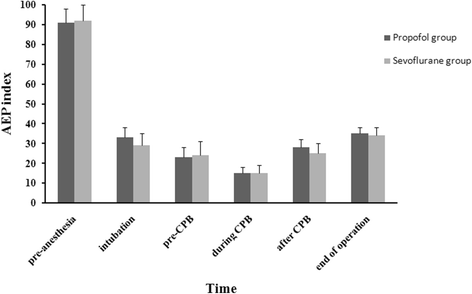Comparison of the myocardial protective effect of sevoflurane versus propofol in patients undergoing heart valve replacement surgery with cardiopulmonary bypass
- PMID: 28259141
- PMCID: PMC5336653
- DOI: 10.1186/s12871-017-0326-2
Comparison of the myocardial protective effect of sevoflurane versus propofol in patients undergoing heart valve replacement surgery with cardiopulmonary bypass
Abstract
Background: This study aimed to compare myocardial protective effects of anaesthesia with intravenous infusion of propofol versus inhalation of sevoflurane in patients undergoing heart valve replacement surgery with cardiopulmonary bypass.
Methods: Seventy-six patients undergoing valve replacement with cardiopulmonary bypass were randomly assigned to propofol or sevoflurane anesthesia during the surgery, respectively. For assessing myocardial injury, cardiac troponin I (cTnI) and creatine kinase isozyme (CK-MB) were determined before induction (T0), 0.5 h (T1) and 3 h (T2) after aortic unclamping, and 24 h (T3) and 48 h (T4) after surgery. The concentrations of interleukin (IL)-6 and IL-10 as the systemic inflammatory and anti-inflammatory markers were also measured at above time points.
Results: In the sevoflurane group, the plasma concentrations of cTnI and CK-MB from Tl to T4 and the levels of IL-6 and IL-10 from T1 to T2 were lower than those in the propofol group. Moreover, a higher ratio of automatic heart beat recovery and a shorter length of intensive care unit or hospital stay were found in the sevoflurane group comparing with the propofol group.
Conclusion: Sevoflurane anaesthesia produced more prominent myocardial protection and attenuated inflammatory response than propofol anaesthesia in patients with valve replacement surgery under cardiopulmonary bypass, resulting in shorter ICU and in-hospital stay.
Retrospective clinical trial registration: Identified as ChiCTR-IOR-16009979 at http://www.chictr.org.cn/ .
Keywords: Cardiopulmonary bypass; Heart valve replacement; Myocardial protection; Propofol; Sevoflurane.
Figures
Similar articles
-
Sevoflurane Versus Total Intravenous Anesthesia for Isolated Coronary Artery Bypass Surgery With Cardiopulmonary Bypass: A Randomized Trial.J Cardiothorac Vasc Anesth. 2016 Oct;30(5):1221-7. doi: 10.1053/j.jvca.2016.02.030. Epub 2016 Mar 3. J Cardiothorac Vasc Anesth. 2016. PMID: 27431595 Clinical Trial.
-
Effects of sevoflurane on cytokine balance in patients undergoing coronary artery bypass graft surgery.J Cardiothorac Vasc Anesth. 2006 Aug;20(4):503-8. doi: 10.1053/j.jvca.2006.01.011. Epub 2006 Apr 21. J Cardiothorac Vasc Anesth. 2006. PMID: 16884979 Clinical Trial.
-
Cardioprotective properties of sevoflurane in patients undergoing coronary surgery with cardiopulmonary bypass are related to the modalities of its administration.Anesthesiology. 2004 Aug;101(2):299-310. doi: 10.1097/00000542-200408000-00009. Anesthesiology. 2004. PMID: 15277911 Clinical Trial.
-
Volatile Anesthetics versus Propofol for Cardiac Surgery with Cardiopulmonary Bypass: Meta-analysis of Randomized Trials.Anesthesiology. 2020 Jun;132(6):1429-1446. doi: 10.1097/ALN.0000000000003236. Anesthesiology. 2020. PMID: 32205551
-
Halogenated anaesthetics and cardiac protection in cardiac and non-cardiac anaesthesia.Ann Card Anaesth. 2009 Jan-Jun;12(1):4-9. doi: 10.4103/0971-9784.45006. Ann Card Anaesth. 2009. PMID: 19136748 Review.
Cited by
-
Changes of recovery quality and early cognitive function after treatment of sevoflurane combined with propofol in the elderly undergoing cholecystectomy.Am J Transl Res. 2021 Oct 15;13(10):11868-11874. eCollection 2021. Am J Transl Res. 2021. PMID: 34786116 Free PMC article.
-
Sevoflurane-Remifentanil Versus Propofol-Remifentanil Anesthesia During Noncardiac Surgery for Patients with Coronary Artery Disease - A Prospective Study Between 2016 and 2017 at a Single Center.Med Sci Monit. 2021 Aug 21;27:e929835. doi: 10.12659/MSM.929835. Med Sci Monit. 2021. PMID: 34417434 Free PMC article.
-
Cardioprotective Efficacy of Sevoflurane in Patients With Rheumatic Heart Disease Undergoing Heart Valve Surgery Under Cardiopulmonary Bypass.J Saudi Heart Assoc. 2024 Aug 1;36(2):120-127. doi: 10.37616/2212-5043.1384. eCollection 2024. J Saudi Heart Assoc. 2024. PMID: 39469525 Free PMC article.
-
Sevoflurane Dampens Acute Pulmonary Inflammation via the Adenosine Receptor A2B and Heme Oxygenase-1.Cells. 2022 Mar 24;11(7):1094. doi: 10.3390/cells11071094. Cells. 2022. PMID: 35406657 Free PMC article.
-
Mitochondrial Dysfunction in Cardiac Surgery.Anesthesiol Clin. 2019 Dec;37(4):769-785. doi: 10.1016/j.anclin.2019.08.003. Epub 2019 Oct 12. Anesthesiol Clin. 2019. PMID: 31677690 Free PMC article. Review.
References
-
- Belhomme D, Peynet J, Louzy M, Launay JM, Kitakaze M, Menasché P. Evidence for preconditioning by isoflurane in coronary artery bypass graft surgery. Circulation. 1999;19(suppl100):II340–4. - PubMed
Publication types
MeSH terms
Substances
Associated data
LinkOut - more resources
Full Text Sources
Other Literature Sources
Research Materials
Miscellaneous


